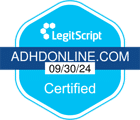About four in five people with ADHD will be diagnosed with another mental health issue at some point in their lives. Depression and anxiety might be the most common “comorbidity.” About 70% of people with ADHD will be diagnosed with depression in their lifetimes.
The Refocused podcast, hosted by Lyndsay Guentzel and sponsored by ADHD Online, has explored some of these other mental health issues that can come with ADHD in a series of podcasts this summer. Experts talked about how commonly these other problems can happen with ADHD, and how people with ADHD can learn to manage sometimes multiple mental health issues at the same time.
Here are some details:
Depression and ADHD:
Lyndsay talked with Lakeisha Love, an ADHD Online provider and family nurse practitioner with experience in helping people with mental health issues.
Lakeisha Love:
“When you are struggling with the ability to be able to function, do your tasks, do your schoolwork, be able to be the best employee that you need to be, making common mistakes. And it’s interrupting your personal life, your interpersonal relationships, and also your work or your school life … then you can see how those symptoms can translate to depression.
Listen to the podcast episode to hear Lakeisha’s other thoughts on managing ADHD and depression.
Obsessive Compulsive Disorder:
In another podcast episode, Lindsay talked with Dr. Roberto Olivardia, a clinical psychologist and clinical instructor of psychology at Harvard Medical School and a clinical associate at McLean Hospital, a psychiatric hospital in Belmont, Mass. He serves on professional advisory boards for Children and Adults With ADHD (CHADD) and The Attention Deficit Disorder Association (ADDA).
Roberto Olivardia:
An estimated 30% of patients with obsessive compulsive disorder, or OCD, also have ADHD, Olivardia says.
“It’s interesting, because we often think of (them) as opposites — ADHD and OCD. I don’t think of them as so opposite. I really think of them as kind of like cousins in a way.”
“These OCD traits can almost be overcompensation for some ADHD symptoms. Sometimes, they’re habits or rituals that are over-compensations for executive functioning issues (from ADHD). But sometimes, they’re not.”
“Very rarely do I have people who come in diagnosed accurately with both. There’s usually one, and whatever is diagnosed, a lot of times, the symptoms of the other get subsumed under that. Where they’re like: ‘Oh, he has OCD, that’s why we assumed he had attention problems. We didn’t even imagine that he also had ADHD.’ Or the opposite. Like: ‘Oh, we assumed it was just the ADHD that was distracting him.'”
You can listen to much more about what Love and Olivardia had to say about some of the common mental health issues that come with ADHD, and check out a wide range of other Refocused podcast episodes, at the Refocused podcast website.






